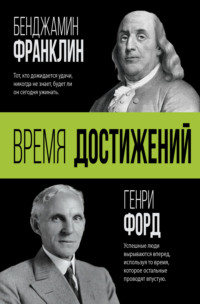![Memoirs of Benjamin Franklin; Written by Himself. [Vol. 2 of 2]](/covers_330/24858395.jpg) полная версия
полная версияMemoirs of Benjamin Franklin; Written by Himself. [Vol. 2 of 2]
"I have condoled sincerely with the bishop of St. Asaph's family. He was an excellent man. Losing our friends thus one by one is the tax we pay for long living; and it is indeed a heavy one!
"I have not seen the King of Prussia's posthumous works; what you mention makes me desirous to have them. Please to mention it to your brother William, and that I request he would add them to the books I have desired him to buy for me.
"Our new government is now in train, and seems to promise well. But events are in the hand of God! I am ever, my dear friend, yours most affectionately,
B. Franklin.""Dr. Rush"Philadelphia.[Without date, but supposed to be in 1789.]"My dear Friend>,
"During our long acquaintance you have shown many instances of your regard for me, yet I must now desire you to add one more to the number, which is that if you publish your ingenious discourse on the moral sense, you will totally omit and suppress that extravagant encomium on your friend Franklin, which hurt me exceedingly in the unexpected hearing, and will mortify me beyond conception if it should appear from the press.
"Confiding in your compliance with this earnest request, I am ever, my dear friend, yours most affectionately,
B. Franklin."To Miss Catharine Louisa Shipley"Philadelphia, April 27, 1789."It is only a few days since the kind letter of my dear young friend, dated December 24, came to my hands. I had before, in the public papers, met with the afflicting news that letter contained. That excellent man has then left us! his departure is a loss, not to his family and friends only, but to his nation and to the world: for he was intent on doing good, had wisdom to devise the means, and talents to promote them. His sermon before the Society for Propagating the Gospel, and "his speech intended to be spoken," are proofs of his ability as well as his humanity. Had his counsels in those pieces been attended to by the ministers, how much bloodshed might have been prevented, and how much expense and disgrace to the nation avoided!
"Your reflections on the constant calmness and composure attending his death are very sensible. Such instances seem to show that the good sometimes enjoy, in dying, a foretaste of the happy state they are about to enter.
"According to the course of years, I should have quitted this world long before him: I shall, however, not be long in following. I am now in my eighty-fourth year, and the last year has considerably enfeebled me, so that I hardly expect to remain another. You will then, my dear friend, consider this as probably the last line to be received from me, and as a taking leave.
"Present my best and most sincere respects to your good mother, and love to the rest of the family, to whom I wish all happiness; and believe me to be, while I do live, yours most affectionately,
"B. Franklin."To * * *(Withoute date.)"Dear Sir,
"I have read your manuscript with some attention. By the argument it contains against a particular Providence, though you allow a general Providence, you strike at the foundations of all religion. For without the belief of a Providence that takes cognizance of, guards and guides, and may favour particular persons, there is no motive to worship a Deity, to fear its displeasure, or to pray for its protection. I will not enter into any discussion of your principles, though you seem to desire it. At present I shall only give you my opinion, that though your reasonings are subtle, and may prevail with some readers, you will not succeed so as to change the general sentiments of mankind on that subject, and the consequence of printing this piece will be, a great deal of odium drawn upon yourself, mischief to you, and no benefit to others. He that spits against the wind, spits in his own face. But were you to succeed, do you imagine any good would be done by it? You yourself may find it easy to live a virtuous life without the assistance afforded by religion; you having a clear perception of the advantages of virtue and the disadvantages of vice, and possessing a strength of resolution sufficient to enable you to resist common temptations. But think how great a portion of mankind consists of weak and ignorant men and women, and of inexperienced, inconsiderate youth of both sexes, who have need of the motives of religion to restrain them from vice, to support their virtue, and retain them in the practice of it till it becomes habitual, which is the great point of its security. And perhaps you are indebted to her originally, that is, to your religious education, for the habits of virtue upon which you now justly value yourself. You might easily display your excellent talents of reasoning upon a less hazardous subject, and thereby obtain a rank with our most distinguished authors. For among us it is not necessary, as among the Hottentots, that a youth to be raised into the company of men should prove his manhood by beating his mother. I would advise you, therefore, not to attempt unchaining the tiger, but to burn this piece before it is seen by any other person, whereby you will save yourself a great deal of mortification from the enemies it may raise against you, and, perhaps, a great deal of regret and repentance. If men are so wicked with religion, what would they be if without it? I intend this letter itself as a proof of my friendship, and, therefore, add no professions to it; but subscribe simply yours,
B. Franklin."Copy of the last Letter written by Dr. Franklin"Philadelphia, April 8, 1790."Sir,
"I received your letter of the 31st of last past relating to encroachments made on the eastern limits of the United States by settlers under the British government, pretending that it is the western, and not the eastern river of the Bay of Passamaquoddy which was designated by the name of St. Croix, in the treaty of peace with that nation; and requesting of me to communicate any facts which my memory or papers may enable me to recollect, and which may indicate the true river which the commissioners on both sides had in their view to establish as the boundary between the two nations.
"Your letter found me under a severe fit of my malady, which prevented my answering it sooner, or attending, indeed, to any kind of business. I now can assure you that I am perfectly clear in the remembrance that the map we used in tracing the boundary was brought to the treaty by the commissioners from England, and that it was the same that was published by Mitchell above twenty years before. Having a copy of that map by me in loose sheets, I send you that sheet which contains the Bay of Passamaquoddy, where you will see that part of the boundary traced. I remember, too, that in that part of the boundary we relied much on the opinion of Mr. Adams, who had been concerned in some former disputes concerning those territories. I think, therefore, that you may obtain still farther light from him.
"That the map we used was Mitchell's map, Congress were acquainted at the time, by letter to their secretary for foreign affairs, which I suppose may be found upon their files.
"I have the honour to be, with the greatest esteem and respect, sir, your most obedient and most humble servant,
"B. Franklin."To Thomas Jefferson, }
"Secretary of State of the United States."}
PHILOSOPHICAL SUBJECTS
To the Abbé Soulavie. 35 Theory of the Earth.– Read in the American Philosophical Society, November 22, 1782Passy, September 22, 1782.I return the papers with some corrections. I did not find coal mines under the calcareous rocks in Derbyshire. I only remarked, that at the lowest part of that rocky mountain which was in sight, there were oyster shells mixed in the stone; and part of the high county of Derby being probably as much above the level of the sea as the coal mines of Whitehaven were below it, seemed a proof that there had been a great boulversement in the surface of that island, some part of it having been depressed under the sea, and other parts, which had been under it, being raised above it. Such changes in the superficial parts of the globe seemed to me unlikely to happen if the earth were solid to the centre. I therefore imagined that the internal parts might be a fluid more dense, and of greater specific gravity than any of the solids we are acquainted with, which therefore might swim in or upon that fluid. Thus the surface of the globe would be a shell, capable of being broken or disordered by the violent movements of the fluid on which it rested. And as air has been compressed by art so as to be twice as dense as water, in which case, if such air and water could be contained in a strong glass vessel, the air would be seen to take the lowest place, and the water to float above and upon it; and as we know not yet the degree of density to which air may be compressed, and M. Amontons calculated that its density increasing as it approached the centre in the same proportion as above the surface, it would, at the depth of – leagues, be heavier than gold; possibly the dense fluid occupying the internal parts of the globe might be air compressed. And as the force of expansion in dense air, when heated, is in proportion to its density, this central air might afford another agent to move the surface, as well as be of use in keeping alive the subterraneous fires; though, as you observe, the sudden rarefaction of water coming into contact without those fires, may also be an agent sufficiently strong for that purpose, when acting between the incumbent earth and the fluid on which it rests.
If one might indulge imagination in supposing how such a globe was formed, I should conceive, that all the elements in separate particles being originally mixed in confusion, and occupying a great space, they would (as soon as the almighty fiat ordained gravity, or the mutual attraction of certain parts and the mutual repulsion of others, to exist) all move to their common centre: that the air, being a fluid whose parts repel each other, though drawn to the common centre by their gravity, would be densest towards the centre, and rarer as more remote; consequently, all matters lighter than the central parts of that air and immersed in it, would recede from the centre, and rise till they arrived at that region of the air which was of the same specific gravity with themselves, where they would rest; while other matter, mixed with the lighter air, would descend, and the two, meeting, would form the shell of the first earth, leaving the upper atmosphere nearly clear. The original movement of the parts towards their common centre would naturally form a whirl there, which would continue upon the turning of the new-formed globe upon its axis, and the greatest diameter of the shell would be in its equator. If by any accident afterward the axis should be changed, the dense internal fluid, by altering its form, must burst the shell and throw all its substance into the confusion in which we find it. I will not trouble you at present with my fancies concerning the manner of forming the rest of our system. Superior beings smile at our theories, and at our presumption in making them. I will just mention, that your observations on the ferruginous nature of the lava which is thrown out from the depths of our volcanoes, gave me great pleasure. It has long been a supposition of mine, that the iron contained in the surface of the globe has made it capable of becoming, as it is, a great magnet; that the fluid of magnetism perhaps exists in all space; so that there is a magnetical north and south of the universe, as well as of this globe, and that, if it were possible for a man to fly from star to star, he might govern his course by the compass; that it was by the power of this general magnetism this globe became a particular magnet. In soft or hot iron the fluid of magnetism is naturally diffused equally; when within the influence of the magnet it is drawn to one end of the iron, made denser there and rarer at the other. While the iron continues soft and hot, it is only a temporary magnet; if it cools or grows hard in that situation, it becomes a permanent one, the magnetic fluid not easily resuming its equilibrium. Perhaps it may be owing to the permanent magnetism of this globe, which it had not at first, that its axis is at present kept parallel to itself, and not liable to the changes it formerly suffered, which occasioned the rupture of its shell, the submersions and emersions of its lands, and the confusion of its seasons. The present polar and equatorial diameters differing from each other near ten leagues, it is easy to conceive, in case some power should shift the axis gradually, and place it in the present equator, and make the new equator pass through the present poles, what a sinking of the waters would happen in the equatorial regions, and what a rising in the present polar regions; so that vast tracts would be discovered that now are under water, and others covered that are now dry, the water rising and sinking in the different extremes near five leagues. Such an operation as this possibly occasioned much of Europe, and, among the rest, this mountain of Passy on which I live, and which is composed of limestone, rock, and seashells, to be abandoned by the sea, and to change its ancient climate, which seems to have been a hot one. The globe being now become a perfect magnet, we are, perhaps, safe from any change of its axis. But we are still subject to the accidents on the surface, which are occasioned by a wave in the internal ponderous fluid; and such a wave is producible by the sudden violent explosion you mention, happening from the junction of water and fire under the earth, which not only lifts the incumbent earth that is over the explosion, but, impressing with the same force the fluid under it, creates a wave that may run a thousand leagues, lifting, and thereby shaking, successively, all the countries under which it passes. I know not whether I have expressed myself so clearly as not to get out of your sight in these reveries. If they occasion any new inquiries, and produce a better hypothesis, they will not be quite useless. You see I have given a loose to imagination; but I approve much more your method of philosophizing, which proceeds upon actual observation, makes a collection of facts, and concludes no farther than those facts will warrant. In my present circumstances, that mode of studying the nature of the globe is out of my power, and therefore I have permitted myself to wander a little in the wilds of fancy. With great esteem,
B. Franklin.P.S. – I have heard that chymists can by their art decompose stone and wood, extracting a considerable quantity of water from the one and air from the other. It seems natural to conclude from this, that water and air were ingredients in their original composition; for men cannot make new matter of any kind. In the same manner, may we not suppose, that when we consume combustibles of all kinds, and produce heat or light, we do not create that heat or light, but decompose a substance which received it originally as a part of its composition? Heat may be thus considered as originally in a fluid state; but, attracted by organized bodies in their growth, becomes a part of the solid. Besides this, I can conceive, that in the first assemblage of the particles of which the earth is composed, each brought its portion of loose heat that had been connected with it, and the whole, when pressed together, produced the internal fire that still subsists.
To Dr. John PringleON THE DIFFERENT STRATA OF THE EARTHCraven-street, Jan. 6, 1758.I return you Mr. Mitchell's paper on the strata of the earth36 with thanks. The reading of it, and the perusal of the draught that accompanies it, have reconciled me to those convulsions which all naturalists agree this globe has suffered. Had the different strata of clay, gravel, marble, coals, limestone, sand, minerals, &c., continued to lie level, one under the other, as they may be supposed to have done before those convulsions, we should have had the use only of a few of the uppermost of the strata, the others lying too deep and too difficult to be come at; but the shell of the earth being broke, and the fragments thrown into this oblique position, the disjointed ends of a great number of strata of different kinds are brought up to day, and a great variety of useful materials put into our power, which would otherwise have remained eternally concealed from us. So that what has been usually looked upon as a ruin suffered by this part of the universe, was, in reality, only a preparation, or means of rendering the earth more fit for use, more capable of being to mankind a convenient and comfortable habitation.
B. Franklin.To Mr. BowdoinQueries and Conjectures relating to Magnetism and the Theory of the Earth.– Read in the American Philosophical Society January 15, 1790.
I received your favours by Messrs. Gore, Hilliard, and Lee, with whose conversation I was much pleased, and wished for more of it; but their stay with us was too short. Whenever you recommend any of your friends to me, you oblige me.
I want to know whether your Philosophical Society received the second volume of our Transactions. I sent it, but never heard of its arriving. If it miscarried, I will send another. Has your Society among its books the French work Sur les Arts et les Metiers? It is voluminous, well executed, and may be useful in our country. I have bequeathed it them in my will; but if they have it already, I will substitute something else.
Our ancient correspondence used to have something philosophical in it. As you are now free from public cares, and I expect to be so in a few months, why may we not resume that kind of correspondence? Our much regretted friend Winthrop once made me the compliment, that I was good at starting game for philosophers, let me try if I can start a little for you.
Has the question, how came the earth by its magnetism, ever been considered?
Is it likely that iron ore immediately existed when this globe was at first formed; or may it not rather be supposed a gradual production of time?
If the earth is at present magnetical, in virtue of the masses of iron ore contained in it, might not some ages pass before it had magnetic polarity?
Since iron ore may exist without that polarity, and, by being placed in certain circumstances, may obtain it from an external cause, is it not possible that the earth received its magnetism from some such cause?
In short, may not a magnetic power exist throughout our system, perhaps through all systems, so that if men could make a voyage in the starry regions, a compass might be of use? And may not such universal magnetism, with its uniform direction, be serviceable in keeping the diurnal revolution of a planet more steady to the same axis?
Lastly, as the poles of magnets may be changed by the presence of stronger magnets, might not, in ancient times, the near passing of some large comet, of greater magnetic power than this globe of ours, have been a means of changing its poles, and thereby wrecking and deranging its surface, placing in different regions the effect of centrifugal force, so as to raise the waters of the sea in some, while they were depressed in others?
Let me add another question or two, not relating indeed to magnetism, but, however, to the theory of the earth.
Is not the finding of great quantities of shells and bones of animals (natural to hot climates) in the cold ones of our present world, some proof that its poles have been changed? Is not the supposition that the poles have been changed, the easiest way of accounting for the deluge, by getting rid of the old difficulty how to dispose of its waters after it was over! Since, if the poles were again to be changed, and placed in the present equator, the sea would fall there about fifteen miles in height, and rise as much in the present polar regions; and the effect would be proportionable if the new poles were placed anywhere between the present and the equator.
Does not the apparent wreck of the surface of this globe, thrown up into long ridges of mountains, with strata in various positions, make it probable that its internal mass is a fluid, but a fluid so dense as to float the heaviest of our substances? Do we know the limit of condensation air is capable of? Supposing it to grow denser within the surface in the same proportion nearly as it does without, at what depth may it be equal in density with gold?
Can we easily conceive how the strata of the earth could have been so deranged, if it had not been a mere shell supported by a heavier fluid? Would not such a supposed internal fluid globe be immediately sensible of a change in the situation of the earth's axis, alter its form, and thereby burst the shell and throw up parts of it above the rest? As if we would alter the position of the fluid contained in the shell of an egg, and place its longest diameter where the shortest now is, the shell must break; but would be much harder to break if the whole internal substance were as solid and as hard as the shell.
Might not a wave, by any means raised in this supposed internal ocean of extremely dense fluid, raise, in some degree as it passes, the present shell of incumbent earth, and break it in some places, as in earthquakes. And may not the progress of such wave, and the disorders it occasions among the solids of the shell, account for the rumbling sound being first heard at a distance, augmenting as it approaches, and gradually dying away as it proceeds? A circumstance observed by the inhabitants of South America, in their last great earthquake, that noise coming from a place some degrees north of Lima, and being traced by inquiry quite down to Buenos Ayres, proceeded regularly from north to south at the rate of ____ leagues per minute, as I was informed by a very ingenious Peruvian whom I met with at Paris.
B. Franklin.To M. DubourgON THE NATURE OF SEACOALI am persuaded, as well as you, that the seacoal has a vegetable origin, and that it has been formed near the surface of the earth; but, as preceding convulsions of nature had served to bring it very deep in many places, and covered it with many different strata, we are indebted to subsequent convulsions for having brought within our view the extremities of its veins, so as to lead us to penetrate the earth in search of it. I visited last summer a large coalmine at Whitehaven, in Cumberland; and in following the vein, and descending by degrees towards the sea, I penetrated below the ocean where the level of its surface was more than eight hundred fathoms above my head, and the miners assured me that their works extended some miles beyond the place where I then was, continually and gradually descending under the sea. The slate, which forms the roof of this coalmine, is impressed in many places with the figures of leaves and branches of fern, which undoubtedly grew at the surface when the slate was in the state of sand on the banks of the sea. Thus it appears that this vein of coal has suffered a prodigious settlement.
B. Franklin.CAUSES OF EARTHQUAKESThe late earthquake felt here, and probably in all the neighbouring provinces, having made many people desirous to know what may be the natural cause of such violent concussions, we shall endeavour to gratify their curiosity by giving them the various opinions of the learned on that head.
Here naturalists are divided. Some ascribe them to water, others to fire, and others to air, and all of them with some appearance of reason. To conceive which, it is to be observed that the earth everywhere abounds in huge subterraneous caverns, veins, and canals, particularly about the roots of mountains; that of these cavities, veins, &c., some are full of water, whence are composed gulfs, abysses, springs, rivulets; and others full of exhalations; and that some parts of the earth are replete with nitre, sulphur, bitumen, vitriol, &c. This premised,
1. The earth itself may sometimes be the cause of its own shaking; when the roots or basis of some large mass being dissolved, or worn away by a fluid underneath, it sinks into the same, and, with its weight, occasions a tremour of the adjacent parts, produces a noise, and frequently an inundation of water.
2. The subterraneous waters may occasion earthquakes by their overflowing, cutting out new courses, &c. Add that the water, being heated and rarefied by the subterraneous fires, may emit fumes, blasts, &c., which, by their action either on the water or immediately on the earth itself, may occasion great succussions.








![Memoirs of Benjamin Franklin; Written by Himself. [Vol. 1 of 2]](/covers_200/24858139.jpg)
